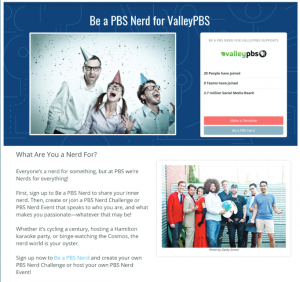PBS Nerd Fundraising Pilot- How Station Capacity & Culture Drive Digital Readiness

PBS Nerd Fundraising Pilot- How Station Capacity & Culture Drive Digital Readiness

In February 2017, PBS partnered with 14 stations to test common P2P fundraising strategies and technologies alongside the PBS Nerd brand. Though the participating stations had a combined 2.7 million reach and raised $33,271, the most striking learnings emerged from stations’ aptitude for experimentation. The pilot brought new insight to the question: “What does digital readiness look like?”
One digital fundraising strategy used effectively by a variety of nonprofit organizations, but possibly overlooked by public media, is peer-to-peer (P2P) fundraising–a $1.53 billion industry. Because of the increasing impact of P2P, PBS Development Services invited member stations to apply for a six-month pilot. Public television has passionate fans, which is a requirement for any P2P campaign. Needing a distinct, yet relatable a message to activate these fans, the campaign theme for the pilot was selected: Be a PBS Nerd.
Campaign Strategy
Onboarding and training began in October 2016, with station’s individual Be a PBS Nerd campaigns launching in February 2017. PBS Development Services partnered with Great Feats, a social engagement platform, to provide the participating stations with P2P fundraising tools.
As part of the pilot, PBS provided to the 14 participating stations the following:
- Cohesive campaign strategy and P2P best practices.
- Locally branded website utilizing P2P fundraising tools.
- Technical training and product support.
- PBS Nerd t-shirts and glasses for recruitment.
- Messaging copy, campaign creative, launch and promotion guide, participant recruitment and coaching emails.
Results

The goal for each station was to recruit 20 participants with 10 actively fundraising on behalf of the station. The fundraising goal for each fundraiser was $250 for a station goal of $2,500. By March 3, the official end of the fundraising pilot, 10 of the 14 stations were actively engaged in the process and raised a combined $33,271 with an average gift of $61. Stations collectively recruited 982 participants, nearly five-times the pilot goal. However, with the number of teams often an indicator to overall P2P success, stations recruited individuals to register for an event but participants failed to create or join a team. Participating stations had on average 3.7 teams with approximately 70 participants
Lessons Learned

The lessons learned at the completion of the P2P product training, onboarding process, and campaign execution fall into three distinct buckets:
Station capacity matters. While all stations brought enthusiasm to the P2P pilot, those with dedicated digital fundraising personnel reaped the most rewards, regardless of strategy or execution.
Station culture matters. Because innovation is a highly iterative process requiring extensive testing and adjustment, developing new growth opportunities requires that stations embrace ongoing experimentation rather than focus on short-term payoff.
Nerds are here to stay. Based on its popularity both externally and internally and its ability to engage younger viewers, PBS Nerd is proving to be a strong, unifying brand. However, its role in station fundraising, including P2P campaigns, is not yet clear.
The experience among PBS stations has produced two emerging lessons:
- Readiness – staff and volunteer capacity, technology, and the time to do it right – is a requirement. You can’t develop a sustained new revenue stream by winging it.
- Building Blocks – The longer a station waits to experiment with digital strategies, the longer it will wait to see new revenue streams emerge.
The report further explores these lessons, the Be a PBS Nerd P2P campaign, and how stations can benefit from implementing new technologies and fundraising strategies to introduce changes in donor behavior and station culture.
